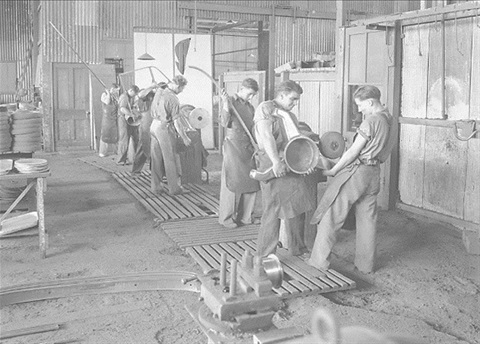WILES Manufacturing

James (Jim) Fletcher Wiles was born in Clunes near Ballarat, Victoria in June 1883.
After establishing businesses in the early 1900s in Ballarat, he patented the ‘Wiles Travelling Army Field Kitchen’ in 1913.
Later known as the ‘Wiles Mobile and Stationary Steam Cooker’, it was an ingenious device containing steam boilers, roasting ovens, hot and cold water tanks, stockpots and related paraphernalia and could be used to quickly prepare large quantities of food and drink.
The cooker could be operated in both a stationary position or put on wheels and was thus capable of rapid transportation by either by motor vehicle or horse.
Wiles moved with his family to Adelaide in April 1926.
In Adelaide Wiles worked successively for John Shearer and Sons, Kilkenny, the Ford Motor Factory, Birkenhead and Horwood Bagshaw Ltd, Mile End.
In April 1929 he set up Wiles Electroplaters Ltd at 10 North Street, Adelaide.
In 1934 the business moved to a 0.23 acre/0.09 hectare site at 215 Waymouth Street.
Although Wiles used conventional electroplating and bronzing finishes such as copper, nickel, silver, tin and zinc to decorate a variety of domestic items like crockery and cigarette lighters, he also specialised in the use of chromium.
Then an innovation in Adelaide, chromium electroplating was particularly useful for supplying hardwearing finishes to products as diverse as motor vehicle parts and steel axe handles.
Wiles died in Adelaide in August 1939. Just before his death Wiles told his sons that if there was another war they should try to adapt his first world war cooker for use in the conflict. His sons carried out his wishes.
Anticipating Army approval, in 1941-42 the Wiles brothers had bought or leased land on Birmingham Street, Mile End South (eastern side of Pymbrah Road) in order to build a factory to manufacture the cookers. The land was close to Adelaide and to rail links. Production of the stationary cooker began there in mid-1941, the mobile version following the next year.
From early 1946 the company began to focus on two enterprises: the production of seeding and tillage implements, including harrows, ploughs, scarifiers and fertiliser and seed drills, and the manufacture of a range of prefabricated kitchen units, each including a sink, stove, refrigerator, hot water service and steel cupboards.
At a time of acute postwar housing shortages Wiles focused particularly on the production of prefabricated homes. (Australia’s first all-steel prefabricated house had been assembled in Melbourne in nine days in April 1947). Wiles bought much of the plant and machinery required to manufacture its new steel products from the Commonwealth Aircraft Corporation. Wiles’s change of direction was initially a resounding success.
In 1952 Wiles made three sizes of prefabricated steel houses. The smallest size, costing £850, consisted of three rooms, steel panel insulated walls, steel roof tiles and fittings including a bath sink, stove, tank stand and wash trough. The house could be constructed by four workmen in a week.
The end for Wiles was surprising and swift. Its net profit for 1954-55 fell dramatically to £2,509, in 1955-56 the company recorded a net loss of £59,257, then a catastrophic net loss of £251,763 in 1956-57.
An additional problem for Wiles Manufacturing was that as the postwar demand for housing was gradually met the need for prefabricated housing fell. In April 1957 Wiles sold its prefabricated steel building businesses in New South Wales and Queensland to a Queensland company.
In early January 1961 Webb Holdings Pty Ltd, a Melbourne-based radio and electrical group, secured 80% of the Wiles Manufacturing Company Limited’s ordinary shares and thus ownership of the company. Four months later Webb Holdings sold Wiles to W.A. Peterson Limited of Melbourne, a company described by one newspaper as ‘a hotch potch of heavy engineering and radio renting and retail interests’.
Within in a couple of years most of Wiles’s Mile End South land was sold. In early June 1963, the South Australian Farmers’ Co-operative Union Limited bought Wiles’s former site on the northern side of Manchester Street, which included offices, canteen and around 0.46 acres/c.0.19 hectares of factory space, for £45,000.
In February 1965 0.51 acres/0.21 hectares on Manchester and Birmingham Streets was sold to Alwin Fisher SA (Pty Ltd) of Birmingham Street for £13,500. In October 1963 Wiles’s agricultural implements business had been sold to Horwood Bagshaw.
Wiles Electroplaters relocated to Hendon in the mid-1970s; later renamed as the Tool Chrome Company Pty Ltd, it is still operating at Wingfield, under different ownership, in 2023.